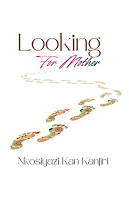Of Memories, Motherhood and Love: A review of Nkosiyazi Kan Kanjiri's Looking for Mother by Ubaji Isiaka Abubakar Eazy
Of Memories, Motherhood and Love: A review of Nkosiyazi Kan Kanjiri's Looking for Mother
by Ubaji Isiaka Abubakar Eazy
'Looking
for
Mother' is the poet's rite de
passage into the authorship world. In the anthology, the poet goes back in time
to trace events from his days of innocence to a present state of experience.
Nkosiyazi poems may be
terse and not as lengthy as the classical types we are wont to encounter in
literature classes; meanwhile, they are nonetheless quite profound. Some are in
fact quite memorable and I AM certain every reader would have mastered at
least one poem by the time they finish perusing the collection. Here is one for
example:
WHEN
MOTHER DIED
I did not cry when
Mother died
I do not know the pain
of losing a mother
I know the pain of
seeing her wilt.
In this poem, the
persona expresses the innocence of a child still trying to conceptualize
death. That child probably understood or envisioned death as a leach gradually
sucking out life from its host or victim; That would explain why he knows the
pain of seeing her wilt'.
Within three lines,
Nkosiyazi is able to convey a depth of emotion that the Victorian poet would
normally convey in seven lengthy stanzas. Poetry thrives on the husbandry of
words and Nkosiyazi knows how to make his words image his feelings of loss and
emptiness without saying much. After reading the poems, you have this pesky
feeling that there might have been more the poet could have said or would have
wanted to say, but he deliberately refuses to dig deeper; perhaps because he
fears to bare his heart to the world.
The poems in the first
part of the anthology are anchored on the poet's memories of his mother; the
wonderful and turbulent times spent with her, including moments when she was subjected
to domestic violence.
In
our home,
In our home, there is a
path to hell.
I followed the fury in father's eyes.
Until I gathered hell
resides
Where Father’s palm meets Mother’s cheek.
When hell breaks loose,
Mother becomes different
shades of heaven. Her face cracks into a thousand splendid stars.
Her voice splits into
the colours of the rainbow.
She sheds no tears,
She was told the sun is
majestic in the storm. )
She was taught the moon shines in the dark where, upon its gaze, children gather around a bonfire to share beautiful stories. (97-100)
Even when relating such
sad experiences as the one above, Nkosiyazi relates them as If from A detached
point of view, but a careful second look would bring one to the realization
that he is actually relating deeply painful events.
In 'Looking for Her',
the poet talks of a particular moment when tears rolled down his eyes as he recalls
his mother's loss. Those tears have been hanging there for five years waiting
for an opportunity to burst forth, perhaps at a time when he is mature enough
to fully conceptualize death. These were the tears that could find no release in another poem titled 'When Mother Died'.
Moving away from death,
nostalgia, and loss, the poet also explores the theme of love in the second part
of the collection. My favourite poem in this section happens to be 'To Love a
Poet and I crave your indulgence to have it copied out here:
To Love a Poet
Girl, learn to love
yourself more when you are with him,
because many are the
times he slips out of your arms to go hug a sonnet.
The wittiness in these
lines strikes me as fresh and memorable.
The final part of the collection titled 'Where I come from' takes a journey back home to Zimbabwe, the poet's country of origin, to capture the poverty and political instability rife in his country as in:
Our story
There is a sunken
people in the sockets of our eyes.
Behind every blink are
ashes of burnt tales.
Our story is a hymn of
bleating goats in an election,
choosing between the
wolf and hyena.
My only fear of
Nkosiyazi’s veneration of Motherhood is that I hope he is not joining the band
of those who erect a shrine in honour of motherhood and then compel all to
worship in this altar. My belief is that, as we honour motherhood, let us not
forget to revere fatherhood as well for both sides play complementary roles in
the development of their offspring.
All in all, for
Nkosiyazi, memories represent the most important aspects of our existence; they
are a thin and infinite path leading back to our genesis and holding
tales of the struggles we have had to encounter to reach our present state.
Left without our beloveds or those we began the journey of life with, our
memories of them become our fortitude. Looking
for Mother is neither one of those anthologies where you would have to rack
your head to draw out meaning nor repeatedly read the lines to grasp meaning.
It is a fast read which reveals much with limited diction and I hope
that you are able to perceive the depth of emotion captured therein.
© Ubaji Isiaka Abubakar
Eazy 2023




Comments
Post a Comment